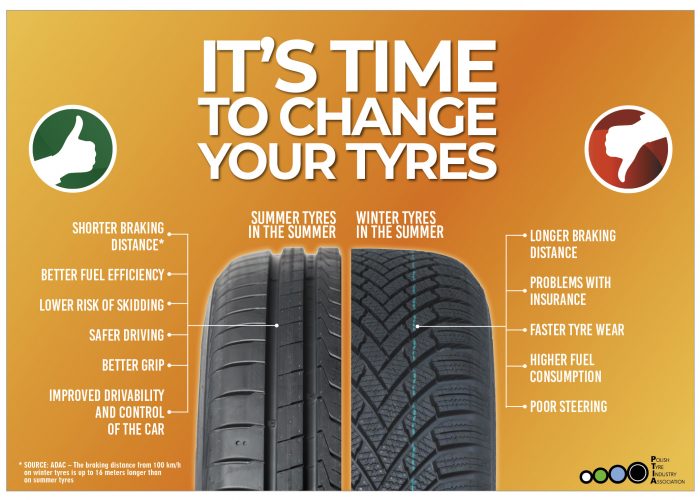Seasonal tyre change allowed during a coronavirus pandemic
The Ministry of Health recognizes the change of winter tires for a summer set as an activity necessary to meet everyday needs
As a result of the intervention of the Polish Tire Industry Association, the Polish Automotive Industry Association and the Car Dealers, the Ministry of Health approved the change of winter tires to summer tyres by people who use cars for commuting and meeting their everyday needs. There is no rush for drivers who do not drive during this period and for those in mandatory quarantine – they can still wait with a visit to a car workshop. It is worth using the services of workshops which follow procedures to protect customers and employees against the coronavirus. PTIA has prepared guidelines for tyre services on how to proceed to maintain safety during the pandemic. By following them, drivers will be less likely to become infected with the coronavirus in a car workshop than they would be to cause a fender-bender or a serious accident while driving on unsuitable tyres.

We must remember that not every type of tyre is suitable for fast driving on hot asphalt. The apparent saving of time and money on replacing tire makes some drivers forget about safety. Unfortunately, the braking distance from 100 km/h on winter tires in the summer is up to 16 meters longer than on summer tires[1].
The choice of tires should be closely related to the conditions of their use. Winter tires have a different tread structure and composition of the rubber compound – at lower temperatures they do not become hard as plastic and remain flexible. The hardness of such tyres ranges between 45-65 on the Shore scale[2], while the stiffness of summer tires is 65-75. This affects, among others faster wear of winter tires in spring and summer and their higher rolling resistance.
– The tread construction of summer tires and their harder rubber compound ensure greater traction at spring and summer temperatures – says Piotr Sarnecki, general director of the Polish Tire Industry Association (PTIA). – If during these days you have to drive to work or a shop, it is better to do it on summer tires or good all-season tires. Thanks to this you will avoid faster wearing of the winter set – adds Sarnecki.
– We appreciate the quick response of the Ministry of Health to our appeal. We are convinced that dispelling all doubts regarding the permit for seasonal tire change by people who use cars for commuting and meeting their everyday needs – such as shopping for groceries – will improve road safety – says Jakub Faryś, President of the Polish Automotive Industry Association (PAIA).
When changing tires, let’s remember to go to a professional car workshop – improper service can easily damage the tire and rim, about which we will not always be informed. As drivers, we have no way of catching mistakes of the staff – when we drive home from a car workshop where our tire has been damaged, it may burst and cause a huge tragedy. The health and life of each of us depends on the quality of tire services. Where can you find a trustworthy tire service? A map of websites with the PTIA’s Tire Certificate is available on certyfikatoponiarski.pl/en.
– Thanks to PTIA’s Tire Certificate, customers can be sure that they entrust their car to professionals. In such certified car workshops TÜV SÜD auditors checked the condition of all the devices, the level of service and the actual technical capabilities of the staff. Therefore, we don’t have to choose to use the services of a given garage only on the basis of the owner’s declarations of its alleged highest quality – Piotr Sarnecki emphasizes.
However, if someone wants to drive on only one set of tires, then good all-season tires with winter approval – at least of the middle class – will be a safe solution. Of course, such tires will not be as good as summer ones in summer, and in winter as good as typical winter tires. However, for those drivers who own small cars and drive rarely – a tan annual mileage below 10 000 km – and at short distances only around the city, then they will be sufficient. But they will not be more economical than seasonal tires in the perspective of several years – if you have driven 4-5 years on one set of summer and winter tires so far, then you will use 2 or 3 sets of all-season tires in that time. If you often travel long distances in both the first and second half of the year and your car is larger than compact – get two sets of seasonal tires. They will be a more economical and safer solution.
This post is also available in:  polski (Polish)
polski (Polish)


